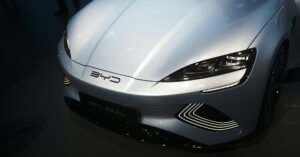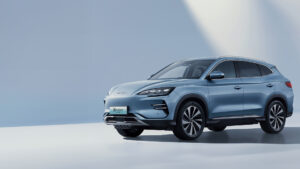
In 2025, Ukrainians purchased 83,443 thousand new passenger cars, which is 17% more than in the previous year. In particular, in December, sales increased 2.2 times to 12,724 thousand, according to AUTO-Consulting
“Thus, 2025 went down in history as the year of the Ukrainian car market’s recovery,” the group’s website states.
Toyota maintained its leadership in 2025, selling 10,700 cars (3.15% less than in 2024), although in the last months of the year it was forced to let Chinese BYD take the lead.
Experts note that BYD became the phenomenon of 2025, rising from 11th place in the ranking to second and occupying 26% of the market by the end of the year with sales of almost 10,600 cars (4.6 times more).
“We have never seen such a rapid breakthrough before. It should be added that BYD’s sales were carried out by so-called “gray” dealers, without an organized network of car dealerships, without service, without a coordinated policy. However, BYD became the second automaker to sell more than 10,000 cars in Ukraine in a year,” analysts said.
They noted that Volkswagen has been in third place in Ukraine for a year in a row, but this result was also made possible by the supply of “gray” electric cars from the Chinese market.
Renault lost two positions over the year and is now only fourth with sales of 6,330 cars (-11.4%), while Skoda, which took fifth place, is not far behind with sales of 6,180 cars (+21.2%).
According to AUTO-Consulting, BMW remains the No. 1 brand among premium cars, although in 2025 it had to actively defend this status from the Chinese as well – sales of the brand, which took sixth place in the overall ranking, fell by 21.4% to 3,800.
“Unexpectedly, Ukrainian consumers began to trust the newly created Chinese premium manufacturers and actively switch to them. That is why we already see Zeekr as number 8 on the market, although a year ago it only made it into the top 20. But Zeekr even had enough strength to overtake Audi,” the report states.
Experts also noted the successful policy of Hyundai, which increased sales by 37% to 3,640 units.
They also noted that Honda is in the top 10 for the second year in a row, which, thanks to “gray” dealers of Chinese electric cars, was able to overtake its colleagues in the Japanese auto industry – Suzuki, Mazda, and Nissan.
AUTO-Consulting emphasizes that the result of passenger car sales in December is due to the end of VAT exemptions on electric cars, whose share exceeded 50% (50.8%) for the first time last month.
“In December alone, Ukrainians purchased more than 6,500 electric cars, which is more than all car sales in the months at the beginning of 2025,” the report says.
In December, BYD took first place and sold 3,300 electric cars, compared to 192 in December 2024.
In addition, thanks to “gray” dealers, Volkswagen took second place in December (1,332 cars) and 10% of the Ukrainian market, surpassing Toyota (1,159 units). Skoda took fourth place with sales of 933 units (+56.3%), and Zeekr took fifth place (898 cars), surpassing all competitors in the premium segment.
“In fact, not all automakers were able to withstand the ‘Chinese electric invasion’ in December in the top 10. Among them were Renault, Hyundai, BMW, and Audi, although their sales were boosted by “gray” deliveries from the Chinese market,” experts noted.
The Ukravtoprom association also notes a 17% growth in the passenger car market in 2025, to 81,300 units. In particular, according to its data, 12,400 cars were sold in December, which is 2.2 times more than in December 2024 and 50% more than in November 2025. According to the association, the top three were BYD with 3,164 units, Volkswagen with 1,298 units, and Toyota with 1,117 units.
Next in the ranking are Skoda with 969 units, Zeekr with 844 units, Renault with 658 units, Honda with 441 units, Hyundai with 375 units, BMW with 324 units, and Audi with 316 units.
The bestseller of the month was the Volkswagen ID.UNYX.
As reported, according to Ukravtoprom, in 2024, initial registrations of new passenger cars in Ukraine increased by 14% compared to 2023, to 69,600 units, while according to AUTO-Consulting, sales increased by 9.8%, to 71,300 units.

Ukrainians purchased about 8,300 new passenger cars in November 2025, which is 58% more than in November 2024 and 6% more than in the previous month, Ukravtoprom reported on its Telegram channel.
According to the association, this result is a record high for the last 14 months.
As reported, in October 2025, this market grew by a third compared to October 2024, to 7,800 new passenger cars.
The most popular brand of the month was again the Chinese BYD with 1,615 cars registered (last November, the brand was eighth with 178 cars).
The top ten most popular brands also included last November’s leader Toyota with 859 units (1% less than last year), Volkswagen with 798 units (+78.5%), Renault with 577 units (+8.3%), Skoda with 561 units (+9%), Zeekr with 397 units (5.2 times more than last year, when it was ranked 20th), Hyundai with 363 units (+96%), Honda with 341 units (2.7 times more), BMW – 239 units (-21.6%) and Audi – 239 units (two more cars).
The Renault Duster was the bestseller of the month.
Thus, according to Ukravtoprom, taking into account the results of November, in January-November, the market accelerated the positive dynamics that began in the first 10 months, with 68,900 new passenger cars sold, which is 7.5% more than last year.
Earlier it was reported that experts attribute this situation on the market for new passenger cars to the approaching deadline for the abolition of incentives for electric vehicles.
According to AUTO-Consulting, Ukrainians purchased 8,530 new passenger cars in November 2025, which is 61% more than in the same month last year and 7% more than in October 2025, with the share of electric vehicles increasing to 40%.
According to Ukravtoprom, in 2024, initial registrations of new passenger cars in Ukraine increased by 14% compared to 2023, to 69,600 units, while according to AUTO-Consulting, sales increased by 9.8% to 71,300 units.

Sales of new passenger cars in Ukraine in July increased by 11% compared to the same month last year, reaching 6,700 units, which is also 8% more than in June 2025, according to Auto-Consulting.
Analysts note that sales in July could have been even higher, but this was hampered by difficulties with car registration in the last days of the month.
“But despite these obstacles, the results for July were very encouraging, as the car market has already moved into positive territory for the first seven months of the year, with growth of +0.84%,” the report said.
Auto-Consulting notes interesting changes among brands. Toyota retained first place, with sales up 3.5% to 918 units in June this year.
“For the first time in history, BYD took second place in the Ukrainian market, overtaking three competitors and pushing VW out of this position. BYD was preferred by 11% of Ukrainian consumers, which is a record among Chinese cars, and the BYD Song model also took second place among the most popular models,” Auto-Consulting reports.
Analysts note that neither Skoda nor Renault could withstand BYD’s relentless pressure, and most importantly, Volkswagen took three steps back, whose high performance is also maintained thanks to electric vehicle deliveries from China.
They also note the growing popularity of Honda, which moved up to sixth place from eighth in June with a 21.4% increase in sales to 323 units.
“BMW and Audi (8th and 9th place) slightly improved their positions, while another phenomenon of this year, Zeekr, lost some ground but remained in the top 10 of the Ukrainian car market,” the report says.
At the same time, analysts express surprise at the decline of Mercedes-Benz, which in July, as in June, ranked only 16th in the rating.
“Mercedes-Benz is no longer leading the premium car ranking in the Ukrainian market, nor is it even among the top three in the premium segment (BMW, Audi, Lexus),” analysts note.
Auto-Consulting believes that the trends observed in the car market in terms of brand positioning will continue until the end of the electric vehicle incentives, “and then it will be time for other forces to come into play.”
In turn, the Ukravtoprom association reported on Telegram that last month Ukrainians purchased more than 6,400 new passenger cars, 1% more than in July last year and 7% more than in June this year.
According to the association, the leading brand Toyota reduced its sales by 20% to July 2024, to 820 units, while BYD is rapidly catching up, improving last year’s result by 3.2 times, to 744 units, and jumping to second place in the ranking from ninth last year.
The top ten also includes Renault with 654 units (+11%); Skoda with 559 units (+48%); Volkswagen with 491 units (+47%); Honda with 319 units (+9%); Hyundai with 298 units (+32%); BMW with 263 units (-58%); Audi with 253 units (+20%); and Zeekr with 191 units (+125%).
“Since the beginning of the year, about 39,300 new passenger cars have been registered in the country, which is only 0.1% more than last year,” Ukravtoprom reports.
As reported, according to AUTO-Consulting, in 2024, sales of new passenger cars in Ukraine will grow by 9.8% compared to 2023, to 71,300 units, and according to Ukravtoprom, initial registrations will increase by 14%, to 69,600 units.

China’s BYD Co. plans to choose a country to build a third European plant within seven to eight months, the company’s special adviser for Europe said Tuesday.
“We are not ruling out any options and are now considering any country,” Alfredo Altavilla said, speaking at an auto show in Milan.
“The site selection process for the third plant has already started and we expect to finalize it within seven to eight months,” he added.
BYD is set to start production at an assembly plant in Hungary in October, while the company’s plant in Turkey is due to start operations in March 2026. The combined production capacity of these two plants will be up to 500,000 cars per year.
Earlier, there were media reports that BYD was considering Germany for a new assembly facility, in part because the country spoke out against the imposition of duties on Chinese car imports last year.
Altavilla denied these speculations, calling them devoid of logic. At the same time, he emphasized that a decision has not yet been made.
He noted that the company is guided by several criteria, including the competitiveness of conditions for battery and car production. At the same time, Altavilla added that it is hard to imagine BYD building a plant in a country that treats Chinese cars poorly.

The President of Uzbekistan visited the BYD Uzbekistan Factory in the Jizzakh region and signed the first cars that rolled off the assembly line.
This is the first stage of a $160 million project. The plant currently produces two models of the brand’s cars. Theannual production capacity of the first stage is50 thousand units.
Thesecond stage of the $300 million project is expected to increase production to 200 thousand electric vehicles per year (in 2027-2028), 350 thousand in 2028-2029, and the third stage of the $500 million project will increase productionto500 thousand electric vehicles (starting in 2030).
For reference: In January-May 2024, Uzbekistan produced a total of 162,608 units of cars. Source – UzAUTO.
The joint venture has been provided with modern industrial infrastructure and nearly 2 km of railway tracks have been laid. The plant has modern equipment and robotic systems from China. The production process is automated. A laboratory for high-precision inspection of the geometric dimensions of electric vehicles has been set up.
As the number of electric vehicles increases, the level of localization is expected to gradually increase. First of all, the production of bumpers, glass, lacquered and plastic parts will be launched. In the future, it is planned to produce batteries, electric motors, aluminum parts, tires and seats.
In the future, the plant plans to export electric vehicles to Kazakhstan, Kyrgyzstan, Turkmenistan, Afghanistan, and Azerbaijan.
BYD, CARS, PLANT, UZBEKISTAN